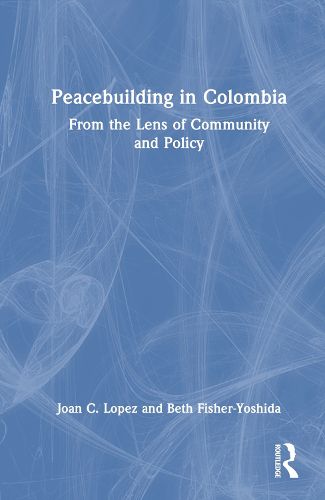Readings Newsletter
Become a Readings Member to make your shopping experience even easier.
Sign in or sign up for free!
You’re not far away from qualifying for FREE standard shipping within Australia
You’ve qualified for FREE standard shipping within Australia
The cart is loading…






In this book, Joan C. Lopez and Beth Fisher-Yoshida offer an alternative narrative of youth and peacebuilding, to the popular one about youth, violence, and peacemaking.
Using testimonies of current and past youth community leaders in Colombia, Lopez and Fisher-Yoshida tell a story of hope, creativity, and unrelenting resilience. They bring attention to the ways peaceful responses to violent conflicts are formed in communities and how these have the potential to inform processes of peacebuilding in areas with similar social and historical characteristics. Focused on action-oriented initiatives, the book concludes by proposing ways in which social change can continue to happen and how we might be able to foster it. Lopez and Fisher-Yoshida specifically explore ways in which we can continue to support efforts and create new initiatives for other youth. Some of these ideas include doing more capacity building, fostering more networking and knowledge transfers, identifying ways of increasing social entrepreneurship, and building more effective youth leaders.
Peacebuilding in Colombia fills an important gap in the literature on the characteristics of peacebuilding. It is a must read for academics, students and practitioners interested in the study and practice of peacebuilding in violent and post violent contexts.
$9.00 standard shipping within Australia
FREE standard shipping within Australia for orders over $100.00
Express & International shipping calculated at checkout
In this book, Joan C. Lopez and Beth Fisher-Yoshida offer an alternative narrative of youth and peacebuilding, to the popular one about youth, violence, and peacemaking.
Using testimonies of current and past youth community leaders in Colombia, Lopez and Fisher-Yoshida tell a story of hope, creativity, and unrelenting resilience. They bring attention to the ways peaceful responses to violent conflicts are formed in communities and how these have the potential to inform processes of peacebuilding in areas with similar social and historical characteristics. Focused on action-oriented initiatives, the book concludes by proposing ways in which social change can continue to happen and how we might be able to foster it. Lopez and Fisher-Yoshida specifically explore ways in which we can continue to support efforts and create new initiatives for other youth. Some of these ideas include doing more capacity building, fostering more networking and knowledge transfers, identifying ways of increasing social entrepreneurship, and building more effective youth leaders.
Peacebuilding in Colombia fills an important gap in the literature on the characteristics of peacebuilding. It is a must read for academics, students and practitioners interested in the study and practice of peacebuilding in violent and post violent contexts.